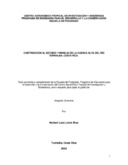Contribución al estudio y manejo de la cuenca alta del Río Turrialba, Costa Rica
Alternative title
Contribution to the study and management of the Upper Turrialba River watershed, Costa Rica
Description
Tesis (Mag. Sc.) -- CATIE, 2003
Abstract
Se realizó el presente estudio con el objetivo de contribuir al manejo integral de la cuenca media y alta del Río Turrialba, Costa Rica, mediante el análisis de interacciones socioambientales, identificación de principales sitios de riesgo a erosión, impacto del uso de la tierra en el proceso de infiltración para poder elaborar propuestas de alternativas tecnológicas para los productores. Se realizó una encuesta sobre el sistema de Producción y se identificaron los principales problemas y potencialidades de la cuenca media y alta mediante un taller FODA y un análisis institucional. Además, se generó un mapa de riesgo a erosión para toda la cuenca del Río Turrialba y se determinó mediante el método del número de curva (NC) la cantidad de escorrentía producida en toda la cuenca del Río Turrialba en base al uso actual del suelo. Los principales problemas en común de la cuenca media y alta fueron la falta de asistencia técnica, no poder aumentar su capital de trabajo, bajos precios para los productos, elevado precio de los insomos y estaciones lluviosas muy fuertes. Los principales sitios de riesgo a erosión en la cuenca del Río Turrialba se localizó en la parte media, debido a la combinación del tipo de cubierta vegetal (caña y café), pendientes y la cantidad de precipitación que se da en esa zona. The objective of the study was to contribute to the integrated management of the upper and middle Turrialba River watersheds by conducting an analysis of socio-environmental interactions, and identifying the principal erosion-prone sites as well as the impact of land use on rainfall infiltration. The results have allowed the development of alternative technological proposals aimed at producers. A survey was conducted of the production systeMON in the study area, and the principal probleMON as well as the positive factors were identified by means of a SWOT workshop and an institutional analysis. A map depicting erosion risk was generated and the quantity of runoff was determined by means of the Curve Number method for the entire Turrialba River watershed. The principal probleMON identified in the upper and medium watersheds were: lack of technical assistance, inability of producers to increase working capital, low product prices, high input prices and intense rainy seasons. The principal erosion-prone sites were located in the middle watershed, the result of a combination of vegetation cover type (sugar cane and coffee), gradient, and levels of precipitation in the area.
Keywords
WATERSHEDS, WATERSHED MANAGEMENT, FARMING SYSTEMS, LAND USE, RUNOFF, INFILTRATION, EROSION, SOIL DEGRADATION, EDAPHIC FACTORS, SOIL CONSERVATION, SILAGE MAKING, PASTURES, STABLING, DIGESTERS, LUMBRICIDAE, ANIMAL PRODUCTION, FARM INPUTS, PRODUCTION COSTSCOSTA RICA, CUENCAS HIDROGRAFICAS, ORDENACION DE CUENCAS, SISTEMAS DE EXPLOTACION, UTILIZACION DE LA TIERRA, ESCORRENTIA, INFILTRACION, EROSION, DEGRADACION DEL SUELO, ENSILAJE, PASTIZALES, ESTABULACION, DIGESTORES, LUMBRICIDAE, PRODUCCION ANIMAL, INSUMOS AGRICOLAS, COSTOS DE PRODUCCION,
Asesor
Jiménez, Francisco
Publisher
CATIE, Turrialba (Costa Rica)
URI (Permanet link to cite or share this item)
https://repositorio.catie.ac.cr/handle/11554/968Collections
- Tesis [1797]


